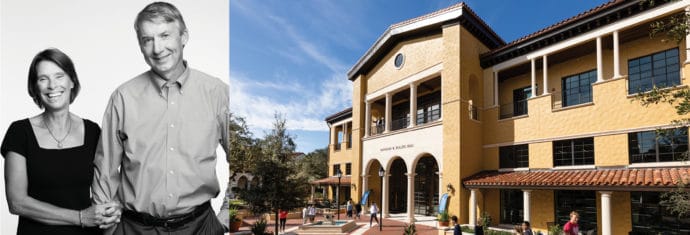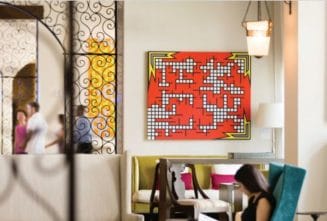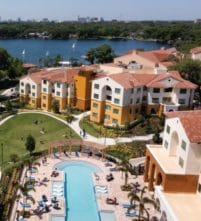
It’s not every day that a trained philosopher becomes more known for his entrepreneurial endeavors than his ability to discuss Aristotle, Plato, and Socrates – although he’s really good at both.
Grant H. Cornwell (St. Lawrence University, 1979), the president of Rollins College, is known as an entrepreneurial educator. Since becoming Rollins’ president in 2015, Cornwell has transformed the physical campus as well as the institution’s reputation all while focused on advancing Rollins’ mission of educating students for global citizenship and responsible leadership. The college has an annual budget of $145,000,000, an endowment that exceeds $450,000,000, and more than 640 employees supporting 3,100 students on campus.
Previously, Cornwell served as the president of the College of Wooster. Before assuming that presidency, he was the vice president of the university, dean of academic affairs, and a professor of philosophy at St. Lawrence. During his time at St. Lawrence, his wife, Marguerite “Peg” Cornwell (also pictured above) (St. Lawrence University, 1997), served as the faculty advisor to the circle there.
In his six years at Rollins, Cornwell has led the college’s largest fundraising campaign, increased enrollment, expanded the diversity of the student body, and guided the construction and renovation of facilities that have transformed the campus. He has also embarked on several leadership journeys involving private/public partnerships, and he’s quite philosophical about his approach to these opportunities.
He says, “Entrepreneurial opportunities needed to be grounded in the college’s mission and emerge from strategic planning. It is easy for colleges to get distracted by good and attractive ideas that emerge from all corners, but the way you really move an institution forward is through an integrated and highly intentional strategy, based in research and rigorously grounded in the core educational mission. Whether an opportunity holds promise to be beneficial is neither guesswork nor intuition; the answer comes from a combination of analysis and creativity. The only reason to undertake a strategic initiative is because there is a clear case that it will advance the college’s ability to deliver on its educational promises to students.”
Art, Gardens, Accommodations, Dining, and a Library All Rolled Into One
One of the things that attracted Cornwell to Rollins is that the college demonstrated an entrepreneurial spirit, as evidenced in the board of trustees having undertaken a visionary project to build a hotel next to campus to serve the college and beyond. With the support of a $12.5 million grant from the Harold Alfond Foundation, the college built The Alfond Inn (thealfondinn.com), a boutique non-profit hotel across from the campus. Profits from the hotel support the Alfond Scholars Program at Rollins, which provides full-tuition, room, and board merit-based scholarships for students who might not otherwise be able to attend. The property has meeting spaces, a library, gardens, and a fine dining restaurant. It has enjoyed over ninety percent occupancy and has been ranked by Conde Nast as Florida’s top hotel.
 The Alford Inn houses a rotating collection of contemporary American art. According to Cornwell, this collection is designed and curated “to provoke reflection on and conversation about the central issues of our diverse democracy.” The hotel’s mission and purpose are consistent with that of the college’s, which is why Rollins embraced this entrepreneurial opportunity. Cornwell observes, “Colleges have deep expertise in education – curriculum, pedagogy, learning outcomes, assessment, student and faculty development – this is our wheelhouse. Public/private partnerships are attractive only to the extent that they demonstrably contribute to the educational purpose. We should seek innovation and creative opportunities that fall within our ken and advance our mission.”
The Alford Inn houses a rotating collection of contemporary American art. According to Cornwell, this collection is designed and curated “to provoke reflection on and conversation about the central issues of our diverse democracy.” The hotel’s mission and purpose are consistent with that of the college’s, which is why Rollins embraced this entrepreneurial opportunity. Cornwell observes, “Colleges have deep expertise in education – curriculum, pedagogy, learning outcomes, assessment, student and faculty development – this is our wheelhouse. Public/private partnerships are attractive only to the extent that they demonstrably contribute to the educational purpose. We should seek innovation and creative opportunities that fall within our ken and advance our mission.”
A Neighborhood by the Lake
Numerous studies have shown that students who live on campus have higher retention and degree completion rates. However, Cornwell and his colleagues appreciate that today’s students desire residential facilities that embrace the richness of the collegiate experience, balancing the need for both privacy and community and balancing student mental health and well-being. In partnership with private developer and trustee of the college, Alan Ginsburg, the college built a residential community, known as the Lakeside Neighborhood, to provide housing for 500 students. While Cornwell cautions against “mission drift” in evaluating public/private opportunities, he explained that the development of the new residences is consistent with the institution’s focus.
He says, “Rollins College is a residential liberal arts college on purpose. We believe that living and learning together on campus deepen students’ engagement with their education, which is the totality of their experience inside classrooms, laboratories, studios, and libraries, but also through athletics, student organizations and activism, and the myriad conversations and relationships that comprise a campus community. We undertook the project as an intentional and strategic approach to address student well-being holistically.”
Mission Space
In describing what it takes to be an entrepreneurial leader, Cornwell notes that one needs to be “always listening for good ideas and have the agility and courage to support them when they emerge.” He says, “Campus communities are fertile grounds for ideas; they come forward with great enthusiasm from faculty, students, trustees, alumni, and parents. An entrepreneurial leader keeps an open mind but a rigorous discipline of supporting ideas that align with the mission and strategy.”
One of the best examples of an excellent idea emerging from a campus community and embraced by an entrepreneurial educator is the renovation and construction of Kathleen W. Rollins Hall at Rollins. This campus center, which was created from renovating an existing facility combined with constructing new square footage, houses ten programs representing the college’s commitment to an applied liberal arts education. In addition to classrooms on the third floor of the building and meeting space, the facility is the home to career and life planning, student media, study abroad, international programs, and scholarship advising. It is also the location for several units that support the social/entrepreneurial mission of the school, including the offices for the sustainability program and leadership and community engagement. The college’s Department of Social Entrepreneurship, which offers both a major and minor in this field, is also found in this building.
According to an interview Cornwell gave for Tradeline (tradelineinc.com), the facility was designed “to be the home of our mission, which is to educate students for global citizenship and responsible leadership.” He went onto say, “We never had the idea that this would be a student affairs space or an academic space or a co-curricular space. This would be a mission space.”
To read more from The Circle, click here.


